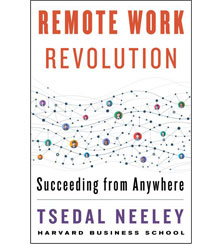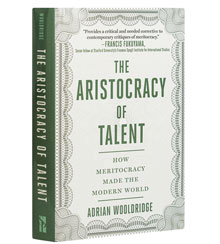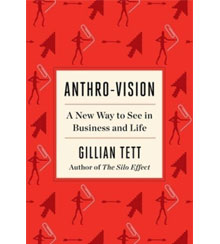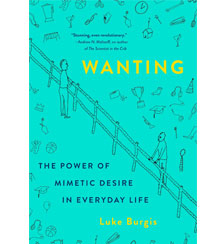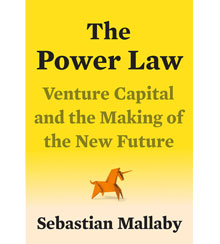The readback: Books we liked in 2021
Covering everything from unconscious desires to the tumultuous logistics industry, these books offer fresh insights for leaders.
Throughout the year, our reviewers delved into the latest business books to unearth essential ideas, observations, and lessons from business history, current events, and state-of-the-art research. Here are half a dozen reads we found particularly thought-provoking in 2021.
Remote Work Revolution: Succeeding from Anywhere
by Tsedal Neeley, Harper Business, 2021
The COVID-19 pandemic won't result in a permanent, wholesale shift to remote work. But it is more and more likely that leaders will need to manage, if they aren’t already, people who are working remotely at least some of the time. The challenges for leaders include keeping people connected when they aren’t in the same place, building trust and alignment without in-person contact, avoiding Zoom fatigue and other technological pitfalls, creating viable boundaries between work and private lives, and transferring highly coordinated work to distributed settings. Harvard Business School professor Tsedal Neeley addresses these obstacles in Remote Work Revolution, a handbook filled with practical and nuanced advice for effectively leading people at a distance.
Arriving Today: From Factory to Front Door—Why Everything Has Changed About How and What We Buy
by Christopher Mims, Harper Business, 2021
A detailed and dedicated explainer about the state of the logistics industry, Arriving Today by Wall Street Journal tech columnist Christopher Mims offers a snapshot of a logistics industry in flux. The world described in the book is a marvel of human ingenuity—from the interactive delivery map created by an automated semitruck to the Willy Wonka–esque energy of Amazon’s fulfillment engine. It is also deeply concerning. The truckers are exhausted, pathetically grateful for a rest stop with room for them to park for the night. The third mate aboard a container ship is so jaded he doesn’t notice the spectacular ocean sunrises. But most of all, it is a world that, because of the pace of change in the industry, is likely to be unrecognizable in five years’ time.
The Aristocracy of Talent: How Meritocracy Made the Modern World
by Adrian Wooldridge, Skyhorse, 2021
In The Aristocracy of Talent, Adrian Wooldridge, political editor of the Economist, traces the history of meritocracy and fears for its future. The decline of the once preeminent city of Venice appears at the end of the book as a cautionary tale. In the early 14th century, realizing that social mobility necessitated downward as well as upward movement, a group of powerful Venetian families sought to preserve the status quo and began la serrata, the closure. Migrants were no longer welcome. Trade came under state control. The population shrank. The era of Venice’s preeminence was over. Wooldridge believes that today’s advanced economies, principally the US and the UK, are heading for a similar fate. Like Venice, these powerful economies gradually came to embrace meritocracy as their guiding principle, only to permit successful meritocrats to rig their systems, which created pools of resentment and anger.
Anthro-Vision: A New Way to See in Business and Life
by Gillian Tett, Avid Reader Press, 2021
The next time you hear someone arguing that a liberal arts education is wasted on businesspeople, direct them to Gillian Tett’s Anthro-Vision. In this new book, the chair of the Financial Times’s US editorial board makes a compelling, readable argument for the business value of social anthropology. Tett finds that this value is delivered in three ways: anthropology makes the strange familiar, it makes the familiar strange, and it attunes awareness when listening for social silencing.
Wanting: The Power of Mimetic Desire in Everyday Life
by Luke Burgis, St. Martin’s Press, 2021
Luke Burgis, entrepreneur-in-residence and director of programs at the Catholic University of America’s Busch School of Business, takes readers down the rabbit hole of mimetic theory. Developed by French social scientist and philosopher René Girard in the 1960s and 1970s, mimetic theory seeks to explain human relations and culture in terms of desire. In short, what we want is what someone else has. The book’s most salient point, even if it is somewhat opaque, is that leaders choose to pursue what Burgis calls transcendent desire: “Magnanimous, great-spirited leaders are driven by transcendent desire—desire that leads outward, beyond the existing paradigm, because the models are external mediators of desire. These leaders expand everyone’s universe of desire and help them explore it.”
The Power Law: Venture Capital and the Making of the New Future
by Sebastian Mallaby, Penguin, 2022
Economic historian Sebastian Mallaby believes that the venture capital industry has “a positive effect on economies and societies” and, what’s more, that its model for cultivating innovation has proven so successful that it has assisted almost every large US technology firm over the past 60 years. His new book, The Power Law, is the story of the men behind the industry—and it is almost entirely men. Heavyweight and richly detailed, the book is both a careering ride through the chaos of startup culture and a sober assessment of how the relationship between founders and their financiers has evolved.



